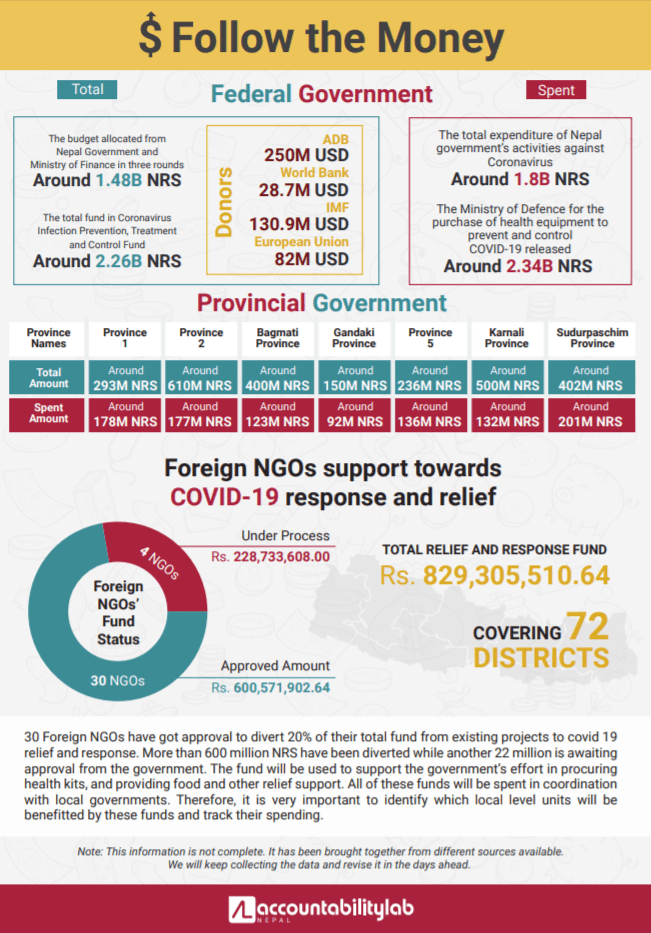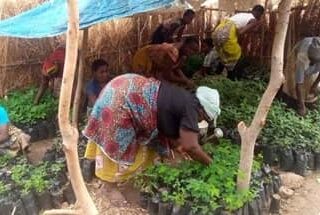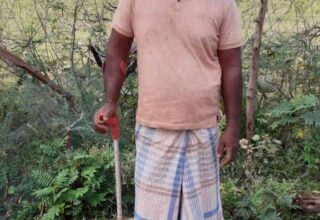In Nepal, a local network called the “Accountability Lab Nepal” is using multi-way communication to eliminate information gaps between government and citizens and debunking rumours during the time of pandemic. Suresh and Bikin report
This is the twentieth in the series of stories from Voices from the Frontline initiative by ICCCAD and CDKN.
The Accountability Lab, founded in early 2012, is an effort to work with young people to develop new ideas for accountability, transparency and open government. It has evolved into a global network of local Accountability Labs that are finding new ways to shift societal norms and solve intractable challenges. The Accountability Lab Nepal was the first of its network labs to open in 2012.
Accountability Lab Nepal seeks to mentor young people to become accountable leaders to contribute towards a positive social change. It also intends to create transparency and accountability by closing the communication gap among different stakeholders such as the government, private sector, civil society organisations and media.
Accountability Lab Nepal’s Coronavirus CivActs Campaign (CCC) is an open, people-powered pandemic response mechanism that uses multi-way communication to gather validated information and debunk rumours about the pandemic. By providing the public with facts in the form of bulletins, the CCC ensures a better understanding of public needs during the pandemic and advocates for inclusive and responsive programs and policies.
COVID-19 and misleading rumors
When COVID-19 started spreading in neighboring countries, the Accountability Lab Nepal team began working from home, a week prior to the government’s announcement of a country-wide lockdown. “This created new challenges to the Lab’s way of working. But it also allowed the team to explore new opportunities to work on the COVID-19 response remotely” Bikin shares.
The Lab started to closely monitor the COVID-19 situation and held discussions with its networks and the community virtually. Based on these discussions, there was quick realisation that rumours and fake news were spreading rapidly on the ground.
Some of the prominent rumours include- “people in Nepal are less likely to contact COVID-19 as a large number of the population has undergone BCG vaccination”, “having turmeric water and washing hands with warm water can cure COVID-19”. Furthermore, growing concerns about the regular check-ups of pregnant women, the safety of health workers and slow responses from the government created distrust among the communities.
Seeing the situation, the Lab felt it was absolutely critical to ensure that essential and validated information reaches the citizens. It would also help the government to navigate their responses during the pandemic in a responsible manner. This would eventually bolster trust, which is essential in times of crisis.
Debunking rumours through learning from the past
This is not the first time Nepal was hit by a crisis. Five years ago, Nepal was rocked by a series of massive earthquakes that killed nearly 9,000 people. As dangerous as the earthquakes themselves were, the misinformation that followed created even more havoc.
At that time, Accountability Lab mobilised its huge network of volunteers across the affected districts to track rumours, concerns, and feedback from the community members and it spread accurate, validated information in communities to tackle the myths. This experience helped the Lab leverage its past learnings to deal with misinformation during the ongoing pandemic.
Drawing on the post-earthquake experience, the Lab started the Coronavirus CivActs Campaign, using its network of youth leaders on the frontline from various backgrounds – including social activists and journalists across the provinces – to collect rumours, concerns, and questions, and disseminate the validated information back to the communities.
“These networks gathered concerns from the communities by tracking social media and calling people who did not have access to the internet, and sent them to the Lab’s core team in Kathmandu” Suresh adds.
The team in Kathmandu, which had access to the internet and contact with various government bodies, conducted research and contacted experts to find answers to these concerns and brought together all the information creatively with info graphics and pictures in bulletins, which were easy to understand.
“To debunk the rumour on BCG vaccination, we quoted researchers on our bulletin who endorsed the fact that coronavirus is a novel virus and has no relation to the BCG vaccination. To bring back the community’s trust in the government, we shared [information] with the public about the insurance, training, and protective equipment provided to the health workers” Suresh describes.
To make it accessible to everyone, the bulletins were published in three different languages – Nepali, Maithili and English. They were disseminated back to the communities by existing networks through social media, emails, websites, phone calls and WhatsApp. Furthermore, various local radio stations supported the Lab in spreading these messages in the form of dialogues to make them more interesting.

Follow the Money
Another initiative under the Coronavirus CivActs Campaign is a regular bulletin called “Follow the Money”. Through the series of “Follow the Money” bulletins, the team brought together scattered information on government’s budget spending in one place for the public to evaluate and raise their voices on ethical spending.
In order to create a clear understanding among the citizens on government decisions and mechanisms, the Lab also regularly published updated information on government COVID-19 responses and disseminated this among stakeholders. This has paved the way for communities to hold the leaders accountable for their actions.
Collaborating with networks
Over time, many other organisations working on diverse issues such as gender, labour migration, youth, and governance joined with the Accountability Lab. These networks of CSOs, government officials, filmmakers and artists added value to the campaign with new ideas and critical feedback as well as fostered collective action.
Furthermore, the campaign has provided a platform for the front liners, particularly women leaders, to share their real-time experiences, challenges and provide feedback to the government. “We have organised webinars in collaboration with others to bring out key accountability issues from the ground and shared them with concerned stakeholders” Bikin says.
CivActs Bulletins as a Basecamp
Different organisations including the government, civil society organisations, and media are asking the Accountability Lab to share the published contents or reuse them on different platforms. National and local media such as Republica have referred to the Lab’s published infographic on the struggles of internal migrants during COVID-19 in one of their articles.
BBC Nepali has also cited the Lab as one of the leading civil society organisations (CSOs) to track government budgets during the pandemic. The data shared through “Follow the Money” bulletins were used by Karobar Daily to show the gaps in government spending. Patipauwa, a local daily, published the Lab’s content on challenges that women have been facing during COVID-19.
Challenges turning into opportunities
The pandemic has certainly posed challenges to the Lab’s way of working, as its primary form of interaction is through face to face meetings and dialogues. However, it has also created opportunities for the team to adapt to the virtual world using multiple new technologies such as e-bulletins, WhatsApp Business Account and digital marketing.
Similarly, it has been challenging to reach marginalised communities as many of them do not have access to the internet and/or cannot read. Different alternatives such as live streaming, phone calls, webinars, and volunteer networks,have been introduced to accommodate their voices and increase the number of communities reached.
Over the years, the team has learnt how to deal with uncertainties during times of crises. Panic within the communities, stress among the staff and restricted movement have challenged them in many ways. Nonetheless, the dynamic team has managed to work successfully with a strong leadership.
“While we worked hard to ensure the rights of many Nepalese, it was equally important to ensure that our team remains healthy, happy and productive” Bikin and Suresh conclude.
Writers’ Perspective
With the experience and networks that we have built during this crisis, we are looking forward to supporting more voices and building the capacity of a greater number of leaders, especially young people and women. Together, we will also encourage and support more active youth to participate in finding solutions to tackle local accountability issues in communities including social, health, and economic challenges in the coming months. This requires that all active citizens who are fighting to ensure accountability, band together and co-create ideas so we can all work towards making governance work for people all over Nepal.
About the Writers
Suresh Chandis is the programme manager and a governance expert at the Accountability Lab Nepal. He has been working with the lab on fighting corruption and building accountability since its inception in 2013. With over 8 years of experience in community engagement, and convening between government and the public, Suresh is dedicated to build accountability in Nepal in order to improve the lives of struggling rural communities.
Bikin Ghimire is the communications and product manager at the Accountability Lab Nepal. With over 6 years of experience in programs design, branding and content generation, Bikin helps ensure that all the positive work the lab does reaches the public. With a technical background, Bikin thrives to build creative solutions to help solve problems in communities towards a positive social change.






